
Reflecting On A Wonderful Experience…
When I first registered for this course, I had zero knowledge of its content and what I would be required to do, the only thing I knew was that it was included in the core curriculum under global studies. I had the conception that this course would be another unexciting core requirement that I would most probably not learn anything from. Yet, it turned out to be exactly the opposite of that. I gained a lot of knowledge and skills about digital literacy that I would have not gotten in any other course, which would definitely help me beyond my academic life.
Each assignment helped me learn something new about myself and contributed in improving one aspect of my personality. However, these three were the most impactful ones.
Soliya: By nature, I am a very quiet person and I don’t usually open up and talk with people that I barely know. However, as this was a graded assignment and I had to do it anyways, I took it as a chance to improve this aspect and work on my communication skills. It definitely paid off, seeing that I was able to keep a conversation with people I didn’t know for two hours, made me realize that it is not as stressful as I thought it would be and that it was fun talking to people about different topics and sharing our different opinions. This experience gave me push to start participating more in class and get to know people outside my circle of friends.
Game: The idea of creating a game from scratch, was very challenging for me. Yet, I learned that as long as I am interested in and dedicated to a certain topic, I would give it my all to create the best version of it, this showed that it can be applied to anything in life as long as I put my mind into something I would be able to excel at it. The final version of this game exceeded my own expectations and I don’t think that I would have gotten the opportunity to do something so meaningful in any other course.
Different platforms we used: the usage of different/ new platforms, such as WordPress, Slack and twitter, also made me gain new skills. I got to understand, which content fits which media platform best and applied this throughout the course, by doing the twitter scavenger hunt and writing all of our assignment in the form of blogs on word press. This expanded our expertise in many digital platforms and made the assignments even more interesting.
Regarding the things that I’ll use for my academic life, I would definitely use pixabay to search for uncopyrighted images for any university projects onward. I would also follow the different steps of finding whether the information on a specific website is true or not, when writing a paper, to deliver the most reliable outcome.
I’ve learned a lot of things throughout this course that I would use in my personal and social life as well. I will use my knowledge on how to distinguish between a fake or a real news, in order to correct anyone, especially my mother, whenever they share a false one on Facebook or WhatsApp. I will also show the video, regarding the school experiment on discrimination between the students with blue eyes and students with brown eyes, to my scout team as they are at the age where they start judging people and forming cliques based on appearance and their judgment. I already started avoiding websites that are not encrypted and altered my personal information on my social platforms. I even showed my sister the do not track episode, “Breaking Ad”, as she was wondering, how all the ads on her social media platforms are always similar to the things she searches for on her browser.
I’m planning to work in a multinational company, hence, we will be dealing with people from around the world. Therefore, I would definitely use the videos of stereotyping and microaggression to ensure that the work environment is free of any biases. I will also explain to my co-workers the importance of using uncopyrighted images, in order to avoid any misunderstandings with our clients abroad.
If I were to show someone my learning in this course, I would use these three things that I created:
My digital literacy: This assignment is the most important one in my opinion, as by doing it, I got to understand the main purpose of the course and what digital literacy really means. Prior to this assignment, my understanding of digital literacy was completely wrong, the same as most of the people (or at least the ones I know). Therefore, I would use this assignment and show it to the people, who don’t really understand the meaning of digital literacy, as the sources used were very informative and explained the concept really well and to the point.
My games reflection: I personally enjoyed doing this assignment the most. Each game I’ve played opened my eyes to something that I wasn’t really aware of, it helped me understand the realness of the situations by putting us into the intended character. So, I would use this assignment to show others that a simple game with a purpose, can raise awareness, convey messages and add to our knowledge in many different ways.
My game about bullying: I already made my family and friends try my game and got feedback on it. I would definitely use it in the future, whenever the topic of bullying is brought up. Creating this game was one of the highlights of the course. I was able to use my academic knowledge to do my secondary research, but I also used my personal knowledge and judgment to choose the topic that I care about and do the different scenarios accordingly. It was definitely an unconventional way of learning, yet the outcome was very beneficial.
If I could change few things about the course to improve it, I would change these things.
Add the twitter scavenger hunt as a main assignment: this exercise combined almost everything we learned in the course together. We got to use a new platform, “Twitter”, interacted with people abroad using the hashtag #netnarr, we posted photos, wrote a poem, identified fake news and proved them wrong. All of these were topics covered during the semester, hence I believe that this would be a very enjoyable and informative assignment.
Use more videos, class activities: I really enjoyed the class activities we did, like the privilege walk and the time we had to build pyramids using magnets and sticks. Both activities broke the class routine and made us all interact with each other while learning something at the same time. I also believe that all the videos we watched in class with no exception were very interesting and informative, especially the one with the school experiment and the one discussing how the same algorithms companies as Facebook, Google and Amazon use to get us to click on ads are also used to organize our access to political and social information. So, I recommend replacing the readings done in class with videos covering the same topics or assign the readings before class as it took us a lot of time to read and we don’t all read at the same pace.
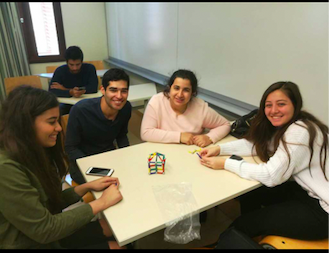
Soliya timings/ an alternative for it: Soliya was definitely a once in a lifetime experience, yet its strict timings and no make-up rule took away from the whole experience. Therefore, I suggest doing a similar assignment, where students can attend only 2 sessions on Soliya and do 2 personal interviews with international students on campus for example, or if they know someone off campus who is not Egyptian, they can interview him/her as well.
I think anyone can take this course. We were 25 students, with totally different personalities ranging from the very quiet ones (Like myself) and the very talkative ones (like Salma and Ramez) and I believe that we all learned and benefited from all the discussions and assignments without any exception. So, I think anyone who is willing to exert some effort and time will definitely enjoy and learn a lot from this course.
Finally, the instructor made sure to use all digital platforms and teaching techniques in order to fit most of the students learning methods and give them the best out of the course. Also, the flexible assignment instructions gave us the chance to be as creative as possible. I would definitely recommend anyone to take this course with Dr. Maha Bali.
My Contribution Assignment!
When I was given this assignment, and asked to suggest an activity, reading, video or assignment that can be added to the course in the future, I found it very difficult at first and had to think about it for a long time as I didn’t have anything in mind. I knew that I wanted to suggest a video or a class activity, as I really enjoyed all the videos and class activities we did in the beginning of some classes. So, I decided to base my contribution to the course on the topic that I felt most connected to and could relate to the most. This was mainly the topic of stereotyping and bias. The fact that this was also one of the topics we discussed in Soliya made it even more fitting for me to choose for this assignment as I got to hear what other people, from around the world, thought about this topic. I chose this video because it tackles the issue of stereotypes and I remember watching this video few years ago and getting all emotional at the end of it saying, “I will never stereotype or judge anyone ever again!” (That didn’t happen of course, but I try as hard as I can, not to). What was obvious, is that no matter where you were from, stereotyping people was something that we all do either accidentally or on purpose. The problem with stereotyping, as seen in the video, is that we place these people in a box which then starts to act as a wall blocking all other characters that these people have which we can relate to. The video was very emotional as it conveyed the message that even the people we stereotype as one thing, if we allow ourselves to accept the fact that they are more than the box we place them in, then we will have more in common with them than what we think. I believe that this video would be very beneficial for coming students, as it shows that it is very easy to create biases and categorize people who seem different than who we are. However, it also shows that it is very easy to break these stereotypes, by looking beyond these differences and focus on what we have in common, which could be as simple characteristic like “Being always late”.
I CancerVive! (Curation)
For my curation assignment, I chose to write about a Facebook group called I CancerVive. I CancerVive is a team created and managed by medical students in Alexandria, their main aim is to support and draw smiles all over the faces of cancer kids in Egypt. The group was created in 2012, when 5 medical students realized how bad Children with Cancer are being served in governmental hospitals. So, they started thinking about ways to help them financially and psychologically as well.
I chose to write about them because they primarily used their digital literacy skills to support a very important cause, rather than making money or a career out of it like most “influencers” do now. I believe that they are special as they chose the hospitals, which are really in need of help and awareness, while using Facebook as a digital platform that is both cost effective and reaches many people. They also have a Twitter and an Instagram account but they are not as active as the Facebook one.
The main goals of this group are, to provide cancer hospitals with the needed devices and medication, support the children and their families throughout the treatment journey and to raise awareness about ways that could help prevent cancer. With over 21K followers on Facebook, they were able to raise awareness and collect enough donations to support not only one but three hospitals in Alexandria.
They mainly depend on their Facebook page, to receive donations, in the form of money/medications/materials, by posting a list of the missing things. As you can see in the pictures below, they provide the people with very detailed information, which facilitates the process down to a couple clicks of a button.
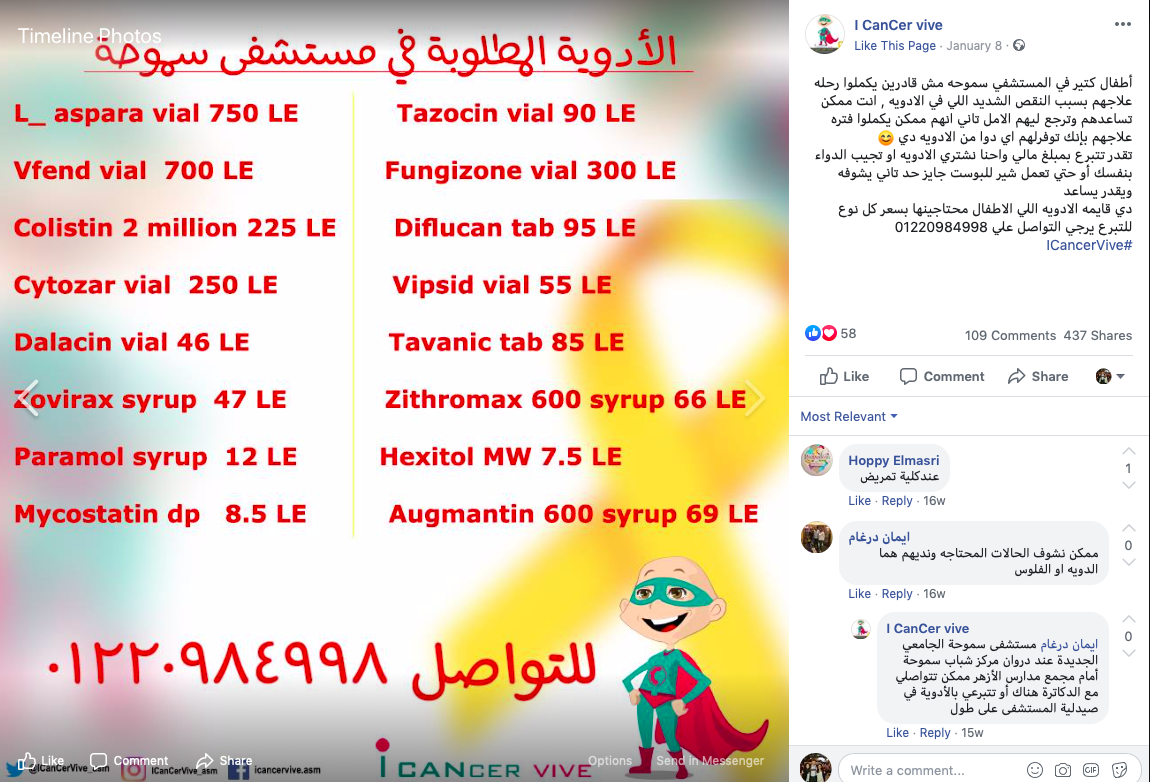
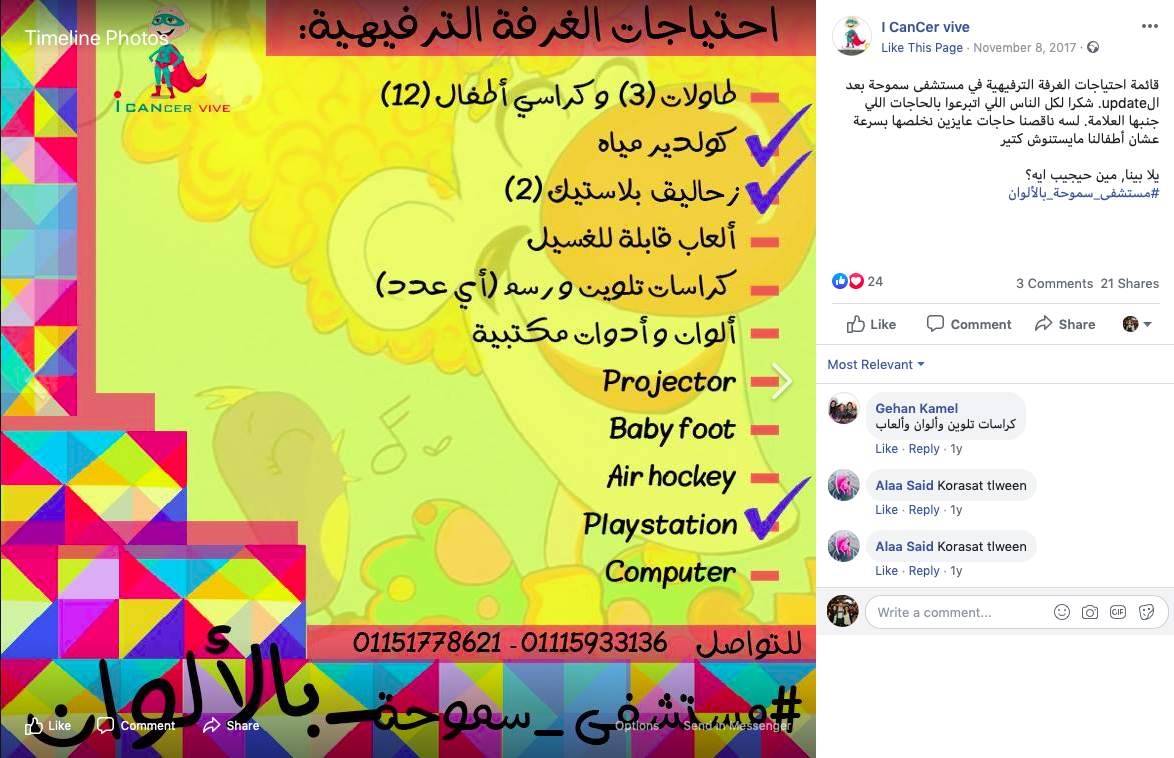
They also use the platforms they created as a mean of providing an opportunity for people to help others in an easy way. This is done by posting the children’s wishes, as seen in the picture below, and people who are capable of making these wishes come true volunteer to make it happen. The impact on the children from this little contribution of help gives them hope and makes them want to fight to beat the cancer. I chose this picture in particular, because even though the wish is very affordable and easy for them to do it, they aim to make others help rather than making everything themselves.
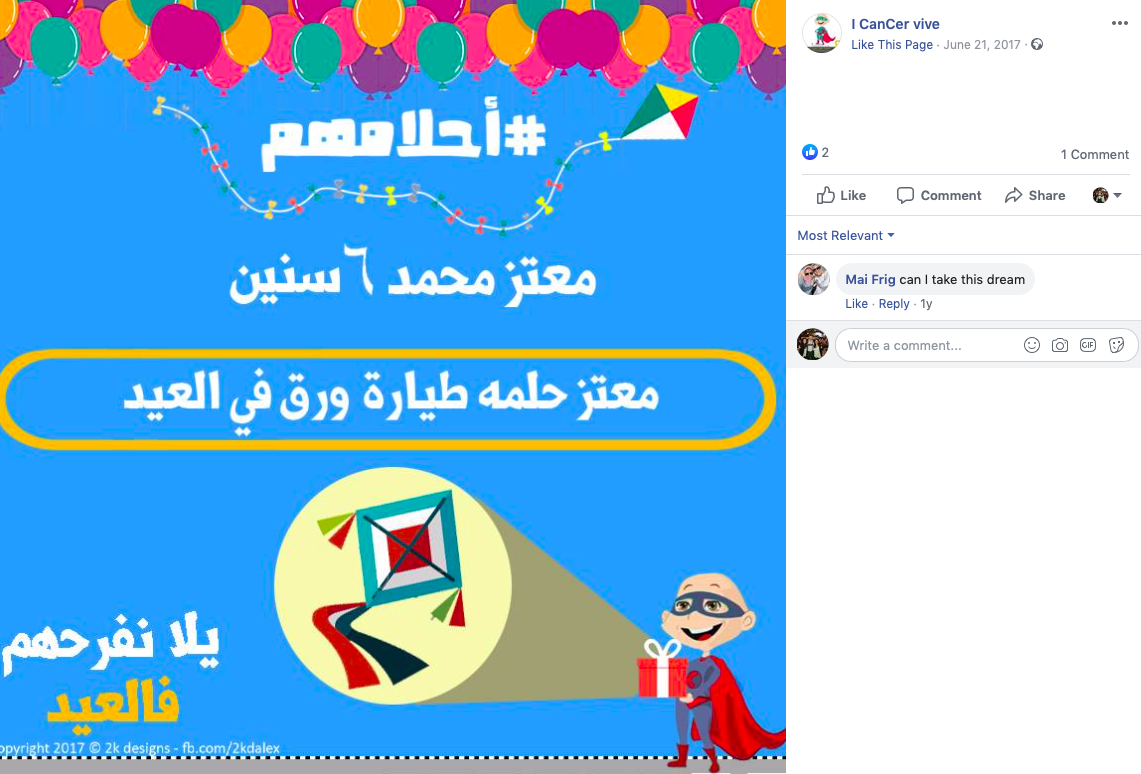
Moreover, their digital platforms are also used as a mean of accrediting themselves and ensuring the people that their donations impact the children’s lives. By posting pictures of the activities done, medications bought, and the presents given to the children. This picture was the one, which got my attention to this organization and what it does to help all these childrens. The smile on her face says it all!
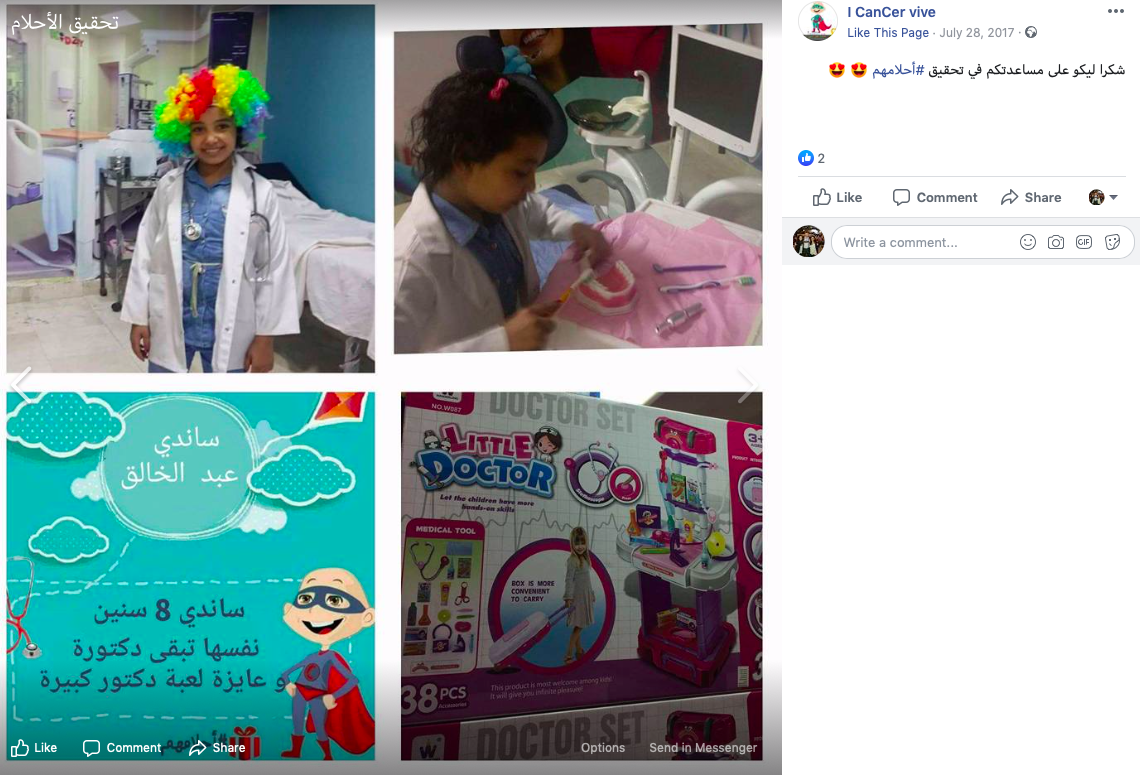
They also make sure to post about all the events they make for the children. As well as the work they do in the hospitals. Like building an entertainemnt room and coloring the walls of certain rooms, like shown in the picture below. All of these posts aims to raise awareness about their work an make more people join them.
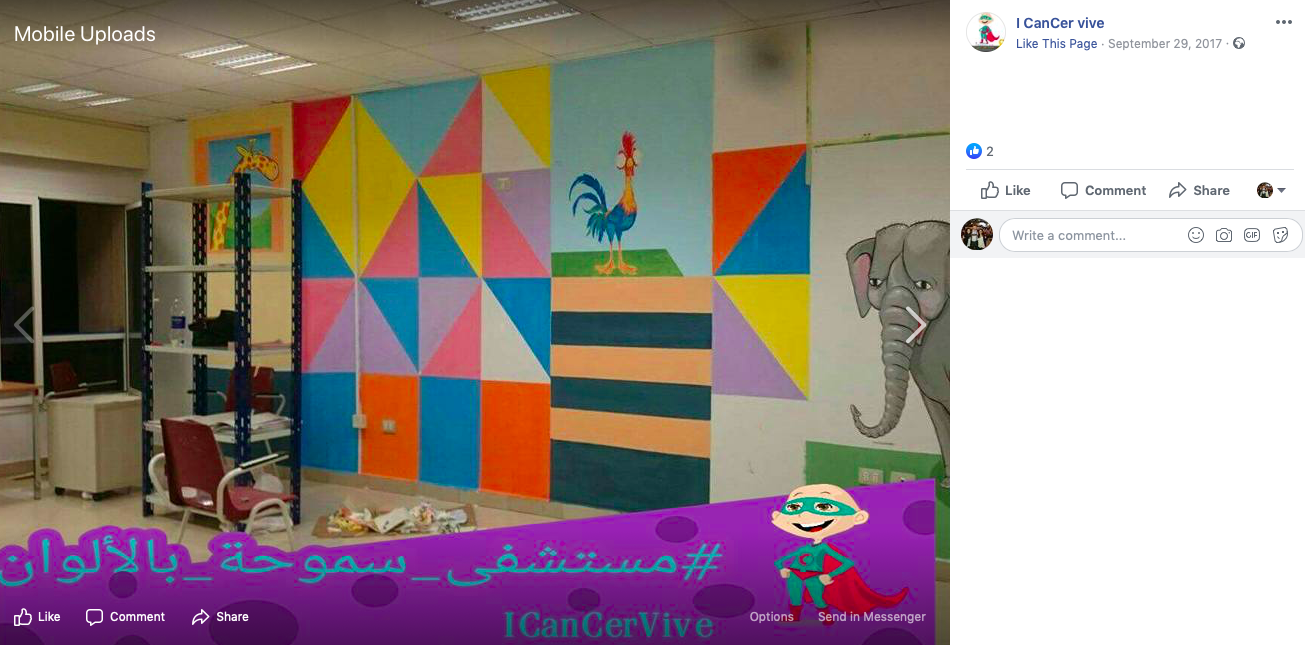
Their digital Platforms also allowed them to reach a number of celebrities who helped them in raising more awareness. Celebrities such as Saad Samir, Henedy and other celebrities (featured in this video), supported the children by sending them encouraging videos and some even fulfilled their wishes of meeting them. This Video of Saad Samir taking one of the cancer survivors to meet Montakhab Masr, shows how powerful Social media is in reaching people and how can it affect others positively, if it’s used correctly and for the right reasons.
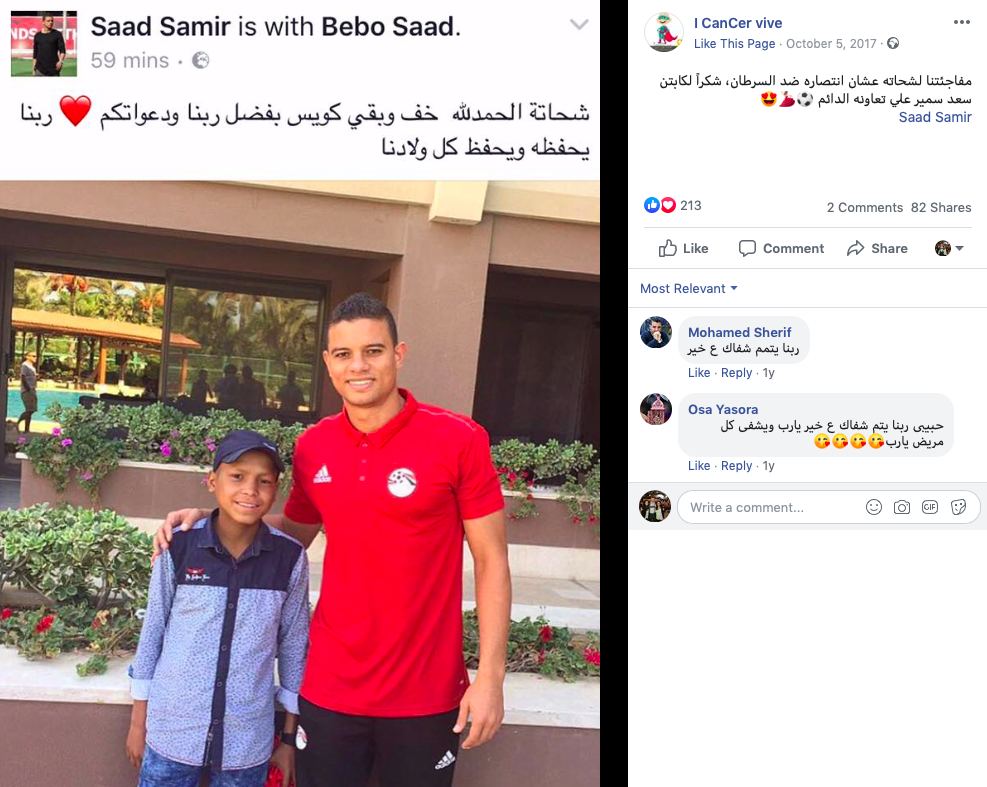
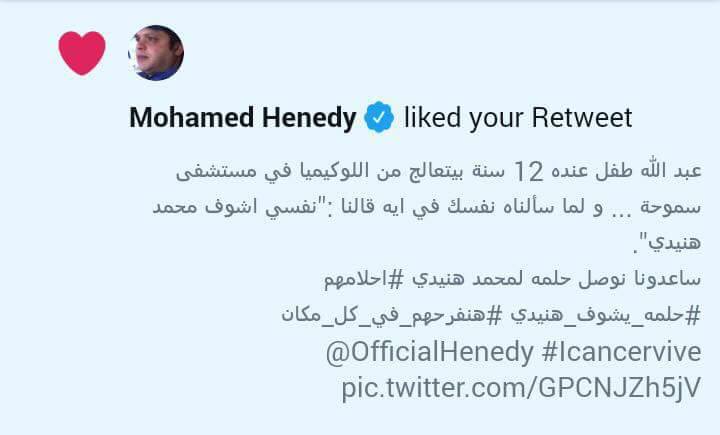
I believe that this group is very successful in reaching its goals. This is shown in their ability to grow from 5 members to over 100 in few years. I personally got to know them through their Page and was inspired by their work, which made me eager to join them along with my scouts. They were also able to receive enough donations to support 3 hospitals and are aiming to support more in the future. Another confirmation of their success is them being featured in many newspapers such as Youm 7 and Masrawy. They also appeared on the famous Radio Channel Nogoum FM to talk about their mission. Getting all these celebrities to join them, also affirms their success and the importance of what they are doing.
For me these are the kind of people, who are supposed to be called “Influencers”, as they influence people to make a difference in the world, rather than buy some unnecessary products that they are paid to advertise. Needless to say, their digital literacy skills played a huge part in their success as without them, they wouldn’t be able to reach all these people and do what they do best; put smiles on children’s’ faces.
Source:
https://www.facebook.com/ICancervive.asm/
https://www.facebook.com/ICancervive.asm/videos/856062084553595/
https://www.facebook.com/ICancervive.asm/videos/896827473810389/
Do Not Track
I decided to write on the episode of “Breaking Ad”, since I find the topic of cookies and how we are getting tracked through them very interesting. The video basically discusses the economic origin of online tracking, how it all started, the reasons behind it and whether we can control it or not.
It all started with the beginning of the web in the 90’s, when the internet was for free. Throughout the year the usage of the web kept on increasing, as a result online sites had to find other ways to make the users pay for all the storage they are using. Hence, online advertising was developed, Ethan Zuckerman called it “The internet’s original sin”. I totally agree with him, since I believe that online advertising nowadays is mainly created through gathering information about users by tracking them, which is a way of invading one’s privacy.
Zuckerman explained in the video that at first online advertising was not very effective, as most of them appeared on unrelated sites or were ignored by the users. This is where the idea of tracking came to life. Websites used it as a way to make money, by gathering information about the user and selling them to advertisers. Advertisers then used this information, to better understand and target the consumers. This gave them a competitive advantage against TV and other types of ads.
Julia Angwin continued by explaining that cookies are used to know who visited a specific site and whether they come back or not. That doesn’t sound dangerous or invading actually! However, other people use cookies, without the user’s permission to track his web behavior and use it for their advantage. This type of cookies is the one that the user must take care of. This part surprised me the most, knowing that there might be a third party tracking me without my consent, is actually frightening.
Angwin also explained that we could have avoided all this hassle by agreeing to pay a certain amount of money for the online services we get. Unfortunately, it’s too late now to do so and it’s also almost impossible to make them not track us because this is basically how we pay them “with our data”. We actually should’ve known better, nothing is free in this world, we would pay for it sooner or later.
This episode was an eye opening one. I’m taking an e-marketing course now, where the usage of cookies is a “good” thing, that helps us develop a better targeting strategy and save A LOT of money. However, this episode made me understand that businesses are gaining money at the expense of our own privacy, which we willingly give up just to use a certain website. I personally didn’t know that there is an option to block the cookies on my browser, which I will definitely use now. Indeed, cookies could be beneficial, yet they need to be regulated and used in a way that does not affect one’s own privacy.
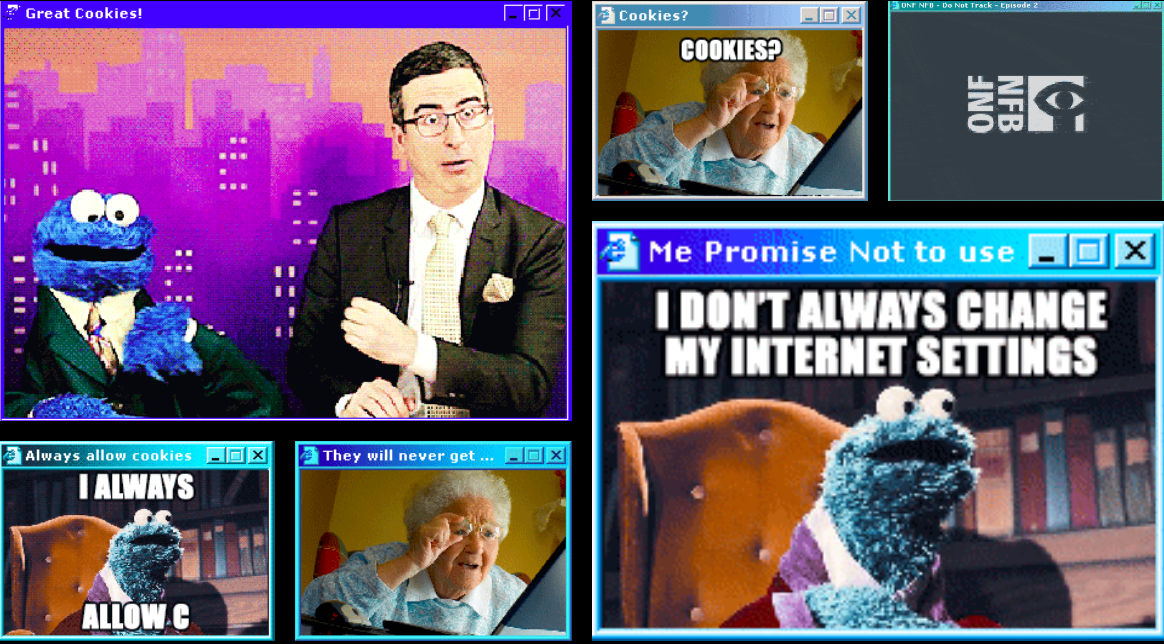
Soliya’s Reflection
When I was first told about this assignment, I honestly did not like it at all. I had no idea what it was going to be like, and I did not like the fact that I was going to be talking to strangers for two hours four times a month. The idea itself was so uncomfortable to me, as I am a very quiet person and I find it difficult to open up and talk with people that I barely know. Hence, this experience was definitely a challenge to me, since the main purpose of Soliya is interacting and communicating with people from different cultures and backgrounds through a video conference.
I was not able to join them for the first session due to technical problems, which made it even more uncomfortable to me as this would have been where we all get to know each other and break the ice. From the second session onwards it worked and I can definitely now say that this was a very beneficial and interesting experience, unlike I suspected. Our moderator was very helpful and made sure that everyone contributed to the conversation. Luckily, I had a very fun and interactive team, who made this experience one of the best ones. We discussed topics such as climate change, stereotypes and sexual taboos. Each one of us shared his thoughts regarding each topic in relation to his culture and personal beliefs. We were 6 people in the group, two Egyptians, one Swedish, one Tunisian, one Mexican, one American and an Italian. Hence, our point of views weren’t always the same, which made the conversations even more interesting. The most impactful conversation we had in my opinion was during the last session regarding sexual taboos. We were all very comfortable talking to each other, people started sharing very personal information about themselves, which made me understand them better. This topic lead to different routes like online dating, harassment and marriage. I actually was surprised when the Mexican and American girls said that they got harassed a lot for wearing shorts/ dresses in the street, I knew that harassment occurs in western countries, but I didn’t know that it was as common as they described it.
Soliya differs from other types of online communication in different ways. As the online communication that I am familiar with, such as Facebook, Whatsapp and Instagram, connect me with people that I already know. However, Soliya connects us with people/strangers from all around the world, to exchange culture and knowledge. Also, the fact that it’s a video conference makes the communication more personal, helps us better understand each other and share our thoughts more easily and openly. The program provides us with an open space, where everyone can say and be whatever they want, unlike the other communication platforms. We can all see each other, we are the ones who chose the topics of discussion, hence, there was no room for judgments or misunderstandings.
Through my contribution in this program I discovered that I am definitely a media consumer. I didn’t initiate any topics nor asked a lot of questions, I mainly talked when someone would directly call me or when a question is asked. I don’t usually post a lot on my social media platforms as well, I only respond to people who mention me on a post and share content that I really like. Yet, I was definitely more interactive on Soliya, as I found the topics very stimulating and wanted to know the people more in order to get the best out of this experience. I also believe that the moderator’s way of making sure that everyone contributed, made me more comfortable. Also, the other Egyptian in the group, would always ask me if I agree with what he was saying after each argument, which made it easier for me to share my point of view.
I believe that in order to foster constructive communication both online and face to face, one must feel comfortable and safe. No one would share his thoughts if they feel that they will be judged or made fun of. I believe that the strategy our moderator used did in fact foster our communication. He gave us an hour each session to talk about a topic we chose without interrupting us. My team members were very supportive and respectful, they didn’t judge anyone and respected all the different point of views shared. We accepted our differences in fact we wanted to know more rather than just criticizing them. As a result, during the last session almost everyone shared very sensitive and personal information about themselves, including their sexuality, their religions and beliefs. Although these are supposed to be serious topics, the discussion was in fact very funny and enjoyable.
All in all, this was definitely a very memorable experience, it gave me the chance to get to know people around the world, while sitting in my room. It got me out of my comfort zone and added to my knowledge in many different ways. I would definitely recommend anyone to try it at least once.
Final Draft Of The Game
For my final draft of the game “A Mother’s Dilemma”, I changed some of the images based on the feedback I’ve gotten from several people. I also added the sources that I’ve used for the images as well as my secondary research.
Creating this game was definitely a challenge. When I was first told that I had to create a game from scratch and come up with different scenarios and situations, I wasn’t sure if I was capable of doing it correctly. However, after I chose the topic of bullying and started researching about it, I was intrigued by it and wanted to learn more. The fact that I witnessed it firsthand with my little cousin made creating this game more than just an assignment. I wanted to create the best version of it as a way to create awareness about how serious bullying actually is. The hardest part in my opinion was coming up with different choices for each scenario, it was very hard to make the “right” answer not very obvious. However, I managed to make most of the choices and situations as realistic as possible, to make the player feel as if he’s actually in this situation. I have learned a lot of things while creating this game, like the fact that parents support is the most important thing for a child who is being bullied. A quick and very thought through response from the parents is crucial, in order to avoid further complications. Children who are being bullied do actually commit suicide, if the parents don’t recognize the issue early on.
There were extra miles that I wanted to explore, if I had more time. The father’s perspective is an example, especially here in Egypt as fathers would most likely tell their sons to fight back. I also wanted to explore bullying in the aspect of a female as well. Moreover, I wanted tackle a different method of bullying such as cyber bullying as it has become a major problem all over the internet and it can be considered an evolution for the bullying I used in my game. I also wanted to conduct interviews with professional psychiatrists concerning the stages that a victim may pass by when they are bullied and to understand the psychology of the bullies and their intentions when it comes to bullying. Such interviews would help more if I considered expanding the game and talking about more details in the subject of bullying.
All in all, this was a very interesting and informative assignment. I really enjoyed developing this game and hope that it would help create the proper awareness about this matter.
Here is the link to my final draft (I hope you like it): https://docs.google.com/forms/d/e/1FAIpQLSeVA9ksq3slFwExN6hfrXWfutNDdP413tKTfAZUasnYMN5uMA/viewform?usp=sf_link
Part 3: First Draft Digital Game
This game aims at raising awareness about Bullying in Egypt. I wanted to raise awareness about the seriousness of the issue as it truly affects many young children and can have some serious complications in the development of their personalities and sometimes, in extreme cases, can result in people taking their lives. It’s an issue faced not only by students at school, but by adults as well. Bullying affects not only the one bullied, but the bully himself as well as the bystanders. It’s the responsibility of the parents, the school and the peers to help stop the bullying. There are many ways that help overcome the effect of bullying, however, one must understand first the whole story and take it step by step. As any wrong action or advice given could very easily worsen the situation.
Primary and secondary research were conducted. Some of the situations mentioned happened in real life, secondary research is provided to back up these situations. I got the situations by talking to a mother whose child was bullied at school.
The player will take the role of Sarah. Sarah is the mother of two children Youssef (13 years old) and Sandra (17 years old), both of them attend the same school, your son is in grade 6 and your daughter is in grade 11. As a mother you notice changes in your sons’ behavior, he no longer wants to go to school, he comes back from school with paint all over his shirt and doesn’t see his friends anymore. After investigating the matter, you find out that he is getting bullied by his classmates for not speaking Arabic well. You don’t know whether you should not interfere and allow him to stand up for himself, interfere by calling the school and informing them about the matter or remove him from the current school and face the risk of worse bullying at the other school he goes to. Note: He’s enrolled in one of the most prestigious schools in Cairo.
Here are the websites I used for my secondary research:
https://www.dosomething.org/us/facts/11-facts-about-bullying
https://www.stopbullying.gov/at-risk/effects/index.html
https://www.education.vic.gov.au/about/programs/bullystoppers/Pages/parentchild.aspx
https://novakdjokovicfoundation.org/verbal-bullying-in-schools/
https://www.pacer.org/bullying/resources/parents/helping-your-child.asp
Digital Redlining, Access, and Privacy
Chris Gilliard and Hugh Culik discuss in their blog post “Digital Redlining, Access, and Privacy”, the meaning of Digital Redlining, its roots and how limiting the access of certain information affects ones’ future and their ability to think critically.
Gillard started his blog by giving an example, that happened in the past, of a student who got humiliated in front of everyone, for unintentionally crossing a boundary set by the administration. She was searching for a poet’s name, which happens to have an inappropriate term as his last name, as a result a buzzer kept on ringing.
He then gives an example of another girl, called Nina who was not able to find information about a specific topic because the university blocks the access for searches that contain certain “inappropriate” words. She was unaware of the fact that her internet access is being filtered and believed that the concept itself doesn’t exist. “Little does she know that the limits of her world are being shaped by the limits imposed on the information she can access” (Gilliard, 2016). We always tend to base our knowledge on the information we are able to access and tend to forget that all of our online activities and searches are being monitored and controlled by a higher authority. If we look at Egypt for example, we’ll find out that many websites are blocked, due to the fact that they publish content against the government. We’re are unable to access a lot of information that we are unaware of.
He goes on by explaining how digital redlining affects people’s ability to think in many ways. Stating that “These informational boundaries at her community college make her less competitive than the graduates of “regular” universities where digital redlining is far less common.” (Gilliard, 2016). Everyone should have the right to access the same amount of information needed. It is not fair for a person who is willing to grow his knowledge base to be restricted by rules that make no sense. False information is the only kind of information that should be restricted from students, as they most probably would lead to a misunderstanding. By restricting information access “. knowledge doesn’t simply become invisible; it does not exist.” (Giliard, 2016)
Gilliard then discusses the meaning of redlining and the different uses of it. He describes it as an act of banning specific groups from accessing specific types of information through a set of education policies, IT practices and investment decisions. This practice in my opinion is a way of controlling a persons’ mind and his way of thinking. A student with limited access to information is automatically less knowledgeable than a student in an elite-institution. It doesn’t just end here, he goes on by saying that “The modern filter not only limits access to knowledge, but it also tracks when people knock against these limits.” (Gilliard, 2016). So, the system doesn’t just control our mind but monitor it as well. This system is very common here in Egypt, as whenever a person shares or posts an offensive thing about the government, he’ll most probably get arrested.
Information Equity
The author discussed in the article “Information Equity”, the meaning of information equity and how important it is for people nowadays to have a good access to information. “Information is foundational to all kinds of equity”, this quote is very powerful and made me think of how, it is almost impossible for us to make any decision without gathering information first. Starting from the very simple thing like checking the weather forecast in order to know what to wear, to gathering information about which president to elect. With the emergence of technology and the use of smartphones, gathering information has become as easy as a press of a button (Miller).
The author then goes on, describing the meaning of information equity and how it is divided into two main categories: agency and social capital. Personal agency is basically a person’s goals in life and the information needed to obtain these goals (Miller). I personally believe that this is a very accurate point, as without proper access to information a person might not be able to achieve his goals. This happens a lot in Egypt, since getting a proper access to information requires either a lot of money or is very hard to access, which in turn changes people’s goals.
As for the Social Capital, the author stated that it is “the benefit people derive from having relationships with other” (Miller). This way of attaining information is the most common way here in Egypt. My mother for example would call all the doctors in our family before giving me a medication for my allergy. Also, asking someone to reference you for a job offer is a normal practice here in Egypt as well. Since obtaining information is hard and expensive, people prefer to benefit from the people around them.
Moreover, the author questioned whether information equity, means that people would have a fair access to information. This is not necessarily the case, since we are not even close to attaining this point. Lievrouw and Farb stated that “More affluent, better-educated, or higher-status individuals and groups are found to have access to more information sources, a wider range of media and content consumption choices, and more online access than other groups” (Lievrouw & Farb, 2003, p. 513). This is so true, as we AUCians for example have way much access to information, provided by our university than any other university student in Egypt. Yet, we basically pay a lot more to get access to it. Another argument regarding this point was, that having a fair access to information depends on the information itself and one’s ability to understand (Miller). I personally believe that information that are hard to understand or unrelatable are useless. No one can make use of this kind of information.
Finally, a very important point discussed in the article, was the fact that some companies tend to indirectly gather information about us and use it as a way of targeting and marketing their product to us (Miller). This is the price we pay, by blindly agreeing to the terms and conditions to be able to use the apps and websites, which we care more about than our privacy.
Prototype Game Design
The reason I chose to revolve the story line of my game around the concept of bullying is because I have experienced it first hand with my younger cousin. At first my family and I overlooked the seriousness of the situation until we saw the impact of this bullying on his personality. He became antisocial avoiding any human interactions beyond his immediate family and invested all his time in video games which only worsened the situation. I also saw how my aunt faced difficulties deciding how to deal with what was happening and also went as far as talking to a psychiatrist to take advice on what she should do. I wanted to raise awareness about the seriousness of the issue as it truly affects many young children and can have some serious complications in the development of their personalities and sometimes, in extreme cases, can result in people taking their lives.
Scenario #1:
A 3rdgrader is getting bullied by his classmates for not speaking Arabic well. His friends no longer want to talk to him, and he doesn’t know whether to tell his parents and face the risk of worse bullying or fight back and get in trouble.
Scenario #2:
As a mother you notice changes in your sons’ behavior, he no longer wants to go to school, he comes back from school with paint all over his shirt and doesn’t see his friends anymore. After investigating the matter, you find out that he is getting bullied by his classmates for not speaking Arabic well. You don’t know whether you should not interfere and allow him to stand up for himself, interfere by calling the school and informing them about the matter or remove him from the current school and face the risk of worse bullying at the other school he goes to.
Scenario #3:
One of your sons’ classmates’ parents requested to meet with you and your husband. She informs you that your son is bullying her son and tells you how this is impacting him physically and psychologically. You’re shocked and don’t know whether to believe and apologize for your sons’ actions or deny the whole matter and stand up for your son.
Scenario #4:
You’re the principal of a very reputable school in Cairo. A mother of one of your students calls you, claiming that her son is being bullied at your school and blames you for not taking actions, as the safety of the students’ is your responsibility. You deny the whole story and tell her that her son does the same thing to his classmates. Or you calm her down and do what it takes to solve the problem and face the risk of facing problems with the parents of the other student.
Scenario #5:
You’re a student in a school. You see the cool kids picking on one of your classmates and making fun of the way he speaks and the way he looks. You feel very angry and sorry for him but don’t know whether you should walk away and avoid getting picked on by the same group, or stand up for him and help him out.
